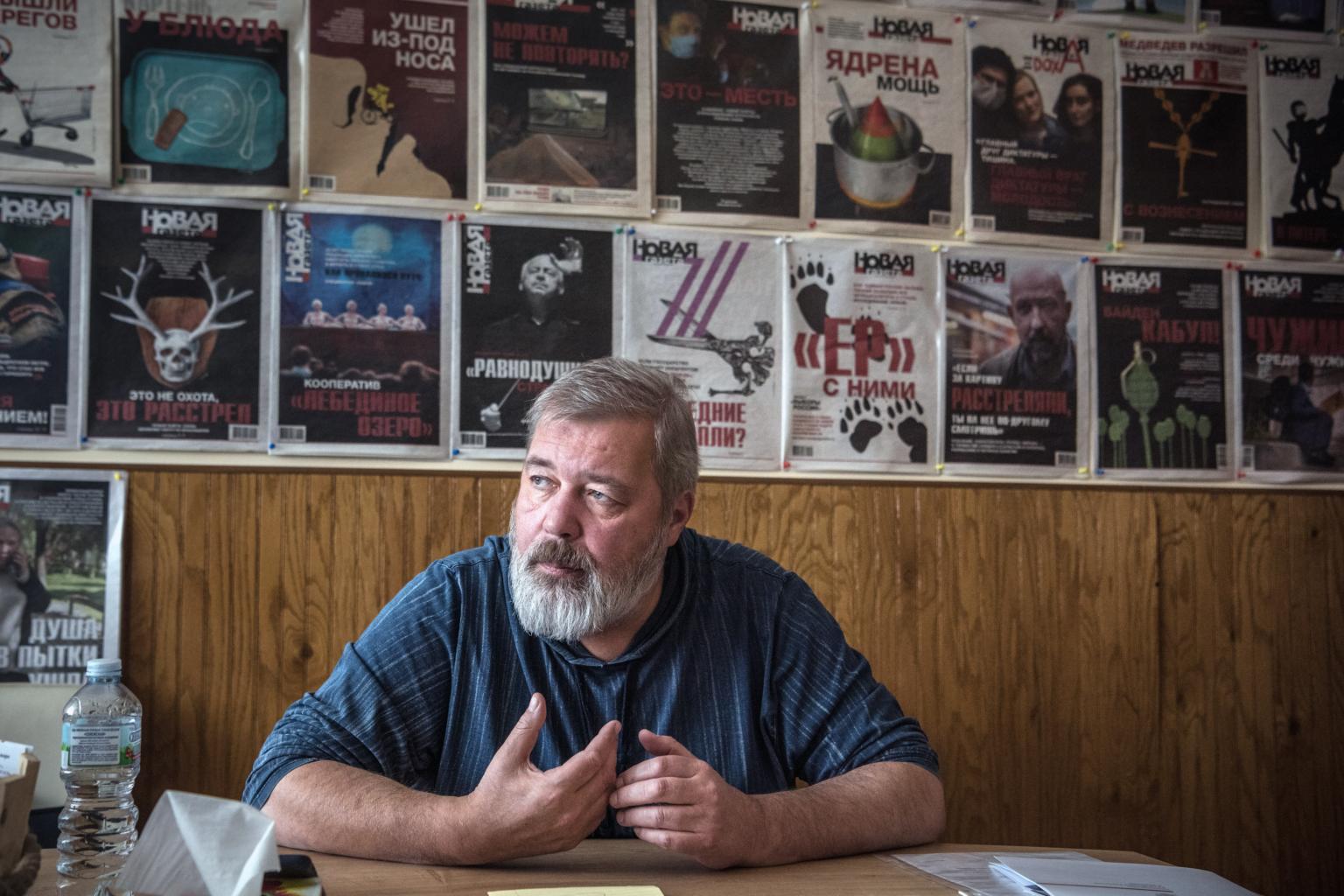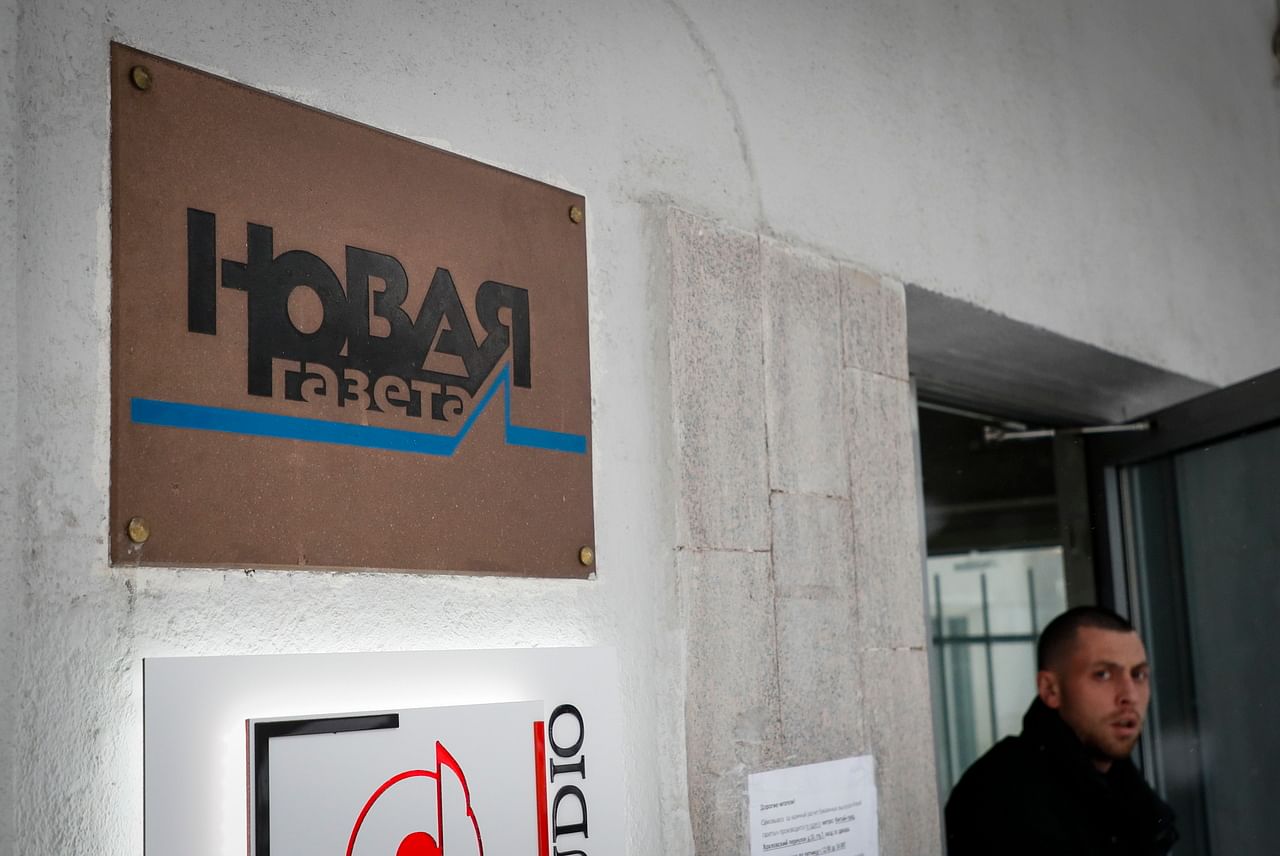Novaya Gazeta, hard-hitting Russian newspaper, suspends publication
Sign up now: Get ST's newsletters delivered to your inbox

The newspaper, led by Mr Dmitry Muratov (pictured), said it would cease publishing until the end of the fighting in Ukraine.
PHOTO: NYTIMES
MOSCOW (NYTIMES) - Novaya Gazeta, the Russian newspaper that helped define fearless journalism in the post-Soviet era and whose editor shared the Nobel Peace Prize last year, suspended publication on Monday (March 28), leaving Russia without any major media outlets critical of the Kremlin as it wages war in Ukraine.
The newspaper, led by Mr Dmitry Muratov, said it would cease publishing in print and online until the end of the fighting - or what it called, in keeping with Russia's new wartime censorship law, "the special operation on the territory of Ukraine".
Earlier in the day, the paper received a second warning from Russia's telecommunications regulator that threatened to shut it down or revoke its licence, Mr Muratov said.
"We kept working until the last possible second," Mr Muratov, the Nobel-winning editor, said in a phone interview. "The newsroom will remain, we're not going anywhere, and we will think about what new products we can make and will think about ways to return to our audience."
But Mr Muratov acknowledged that he could not say what exactly those products would be or when the paper could resume publication.
His newspaper, which has suffered the murders of six of its journalists in its three-decade existence, held out longer than any other independent media outlet based in Russia under President Vladimir Putin's crackdown on what remained of the country's free press.
Russia's only independent television news channel, TV Rain, suspended operations shortly after the war began in late February, and the country's most popular liberal radio station, Echo of Moscow, was shut down by its board at around the same time.
Hundreds of Russian journalists have fled the country, fearing enforcement of a law signed by Mr Putin this month that threatens prison terms of up to 15 years for anyone whose reporting about the war in Ukraine deviates from the Kremlin narrative.
Rather than shut down immediately, Novaya tried to keep reporting, publishing several searing, eyewitness articles from the front lines in Ukraine.
To try to avoid prosecution, Mr Muratov made some compromises, such as avoiding use of the word "war" to describe the invasion, which the Kremlin insists should be called a "special military operation".
The newspaper had tried to draw attention to Kremlin's attack on media freedom by publishing blank pages to represent the information they were not allowed to report, according to The Moscow Times.
On Sunday, Mr Muratov decided not to publish an interview with President Volodymyr Zelensky of Ukraine after Russia's telecommunications regulator ordered Russian news outlets to refrain from doing so.
For a time, Mr Muratov's connections in the Russian elite, along with his Nobel, seemed to offer some protection. But the Kremlin appeared determined to silence Novaya as well, leaving Russians without any major independent media outlets based in their country.
"We are forced to suspend the publication of the newspaper and not update the website and our social networks until the end of hostilities on the territory of Ukraine," Mr Muratov said in an e-mail to subscribers on Monday.
"For us, and, I know, for you, this is a terrible and difficult decision. But we must preserve each other, for each other."
Mr Muratov promised that he would stay in Russia. "This is absolutely certain," he said.
Novaya helped blaze the trail for Russian investigative journalism after the fall of the Soviet Union. Mr Mikhail Gorbachev, the last Soviet leader, donated a part of his Nobel Peace Prize winnings to help the paper buy computers when it was founded in 1993.
The paper revealed abuse by Russian mercenaries in Syria, torture in Russian prisons and under-documented environmental catastrophes across Russia. It showed that Russian soldiers, contrary to Mr Putin's assertions, fought in the separatist war that the Kremlin fomented in 2014. And in 2013, it documented the inner workings of the St Petersburg "troll factory" that the United States would later accuse of interfering in the 2016 American election.
Perhaps its most courageous exposes have come out of Chechnya, the republic in the Russian Caucasus ruled by strongman Ramzan Kadyrov. Its 2017 reporting on the torture and killings of gay men there prompted a global wave of outrage.
Several reporters paid with their lives.

A man leaves a building housing the head office of the Novaya Gazeta newspaper in Moscow on March 28, 2022.
PHOTO: EPA
In 2006, Ms Anna Politkovskaya, the celebrated Novaya journalist who had covered Chechnya extensively, was gunned down in her Moscow apartment building. In 2009, Ms Natalia Estemirova, who also wrote about Chechnya, was kidnapped in Grozny, the Chechen capital, and her body was later found in a neighbouring republic. Neither murder was ever fully solved.
The newspaper also embraced a humanitarian mission. Its newsroom off central Moscow's Boulevard Ring was a hub for people seeking justice and help in the face of corruption and the whims of the Russian authorities.
Mr Muratov used the paper to raise money for causes such as children with rare diseases, and last week, he announced he would auction off his Nobel medal with the proceeds donated to people fleeing the war.
"There are many offers" for the medal, Mr Muratov said in Monday's message to subscribers, "and we will help Ukrainian refugees and sick Ukrainian children".
Last year, when awarding the Nobel Prize, Ms Berit Reiss-Andersen, chairman of the Norwegian Nobel Committee, called Novaya Gazeta "the most independent newspaper in Russia today".
In accepting the award in December, Mr Muratov warned of the drumbeats of war, castigating the "crazy geopoliticians" for whom "a war between Russia and Ukraine is not something impossible any longer".
He said in his acceptance speech in Oslo: "The authorities are actively selling the idea of war. People are getting used to the thought of its permissibility."
Following the announcement on Monday, Ms Elena Milashina, the Novaya journalist who uncovered the torture and killings of gay men in Chechnya, said she would continue her work, and publish it on social media.
"Thank you for supporting and loving us, and even for hating us, because you were reading us," Ms Milashina said in a post on Facebook - the social network that, along with Instagram, the Russian government blocked this month.


